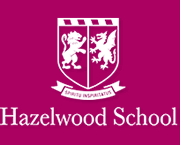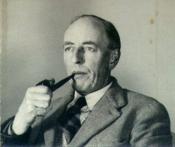
War Memorial
| 2nd Lieutenant Geoffrey Desmond GORDON | |
|
Grenadier Guards Date of birth: 2nd September 1899 Date of death: 30th March 1980 Survived aged 80 Unknown |

|
| Geoffrey Desmond Gordon was born at Sheffield on the 2nd of September 1899 the second son of Dr Robert Gordon MD and Beatrice Mary Gertrude (nee Wilks) Gordon of 26 Wostenholm Road, Sheffield. He was educated at Hazelwood School until July 1913 where he was a member of the Football XI in 1909, 1910, 1911 and 1912 and of the Cricket XI in 1910, 1911, 1912 and 1913. The school magazine wrote the following on his 1909 football season: - "(Inside right) - His shooting leaves something to be desired; still he has plenty of pluck, and should develop into a very useful player, if only he will go in for a strict training diet!" Of his 1910 football season they wrote: - "(Inside right) - Has not fulfilled his promise of last year, his play lacking dash, and his shooting being devoid of power; is seen to better advantage when operating in the middle line." They wrote of his 1911 football season: - "(Centre forward) - Gave great promise in the earlier matches, but this was not fully sustained; he doubtless suffered from the weakness of our inside forwards; still he might throw more dash into his play, and imbue his shooting with more sting." Of his 1912 football season they wrote: - "(Centre forward) - Is in some respects an ideal pivot for the attacking line, dribbling neatly and combining prettily with his wing's; but he lacks thrustfulness and is diffident of his own shooting power, whilst his left foot is still more or less a "passenger"; has not yet learnt where to station himself after parting with the ball." They wrote the following of his 1910 cricket season: - "Has made some good catches at point, and gives promise of becoming a most serviceable custodian, but his batting is still far too rustic in character." Of his 1911 cricket season they wrote: - "A plucky young stumper; should be good next year; lets too many byes at present; moderate bat." They wrote of his 1912 cricket season: - "A capital wicket keeper, but rather inclined to shirk the hard knocks inseparable from the post, and therefore not seen at his best on a fiery pitch; there are great possibilities about his batting, but at present he is not reliable." Of his 1913 cricket season they wrote: - "A good wicket keeper - came on enormously and was brilliant as times; must learn to take hard knocks. Still has many faults as a bat, but possesses some pretty shots." On leaving the school the magazine wrote of him: - "With him we lose the last of a family, four in number, all of whom gained scholarships from Hazelwood within the past six years. A very useful member of both cricket and football elevens, an enthusiastic leader of the choir, and a general favourite. We look forward confidently to his future and wish him all the luck." He went on to Oundle School on a Scholarship where he was in Crosby House from September 1913. He served as a Sergeant in the Officer Training Corps, was a member of the Cricket XI in 1916 and was appointed as Head of House and as a Prefect in 1917. While still at school he applied for a commission on the 28th of September 1917. He enlisted at the King's Own Yorkshire Light Infantry Recruiting Depot, Pontefract as Private 16377 in the York and Lancaster Regiment on the 3rd of January 1918. At a medical examination, which took place on the same day, it was recorded that he was five feet ten inches tall and that he weighed 139lbs. It was also recorded that he had a fresh complexion, blue/grey eyes and light brown hair. He was posted to the Household Brigade Officer Cadet Battalion at Bushey Hall the following day. He was commissioned as a 2nd Lieutenant in the Grenadier Guards, Special Reserve of Officers, on the 26th of June 1918 and was posted to the 5th (Reserve) Battalion of his regiment at Buckingham Gate on the 9th of July 1918. He embarked for France on the 1st of November 1918 and landed at Boulogne later the same day. On the 6th of November he was taken ill and was evacuated to England from Le Havre on the 21st of November, landing at Southampton the following day. A Medical Board sat at the Penryn Extension, 1st Southern General Hospital, Birmingham on the 16th of December 1918 to report on his case: - "This officer began to feel ill at the above place and date (Chelsea Barracks in October). He was posted to France and crossed to Boulogne on 1/11/18. He reported sick on 6/11/18 and was admitted to No. 2 General Hospital, Havre whence he was transferred here. On 22/11/18 he was transferred to Penryn Extension. Officer proceeded on 3 weeks leave. Instructed to report to O.C. Reserve Btn. Chelsea on expiration." He was demobilised at No. 1 Dispersal Unit, Thetford on the 21st of January 1919. He was promoted to Lieutenant on the 26th of December 1919 and relinquished his commission on the 1st of April 1920. On his return to civilian life he entered Cambridge University in March 1919 to read medicine. He was married at St Mark’s Church, Southsea to Enid Muriel Alice Newton (nee Wade) on the 11th of August 1925; they had a son, Alexander "Julian" and a daughter, Elizabeth Pamela Mary, born at Taiping on the 29th of September 1927. He qualified in January 1925 and later that year he was appointed as Junior Ophthalmic House Surgeon at St Thomas’s Hospital. He took his finals in June 1925 and left the UK in February 1926 for the Malay States, having completed his diploma in Tropical Medicine and Hygiene on the day before he sailed. He worked there as a Medical Officer. He was commissioned as a Lieutenant in the Royal Army Medical Corps on the 24th of September 1939 and was promoted to Captain on the 24th of September 1940. He was later the Senior Medical Officer for the Ministry of Pension and National Insurance and was awarded the Order of the British Empire for his services in the Queen's Birthday Honours List of June 1960. He died in Somerset. |
|
| Went on to Oundle School |
Back